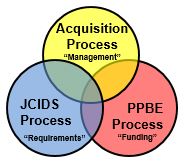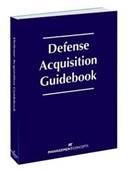 The Department of Defense (DoD) Acquisition Process is one of three (3) processes (Acquisition, Requirements, and Funding) that make up and support the Defense Acquisition System and is implemented by DoD Instruction 5000.02 “Operation of the Adaptive Acquisition Framework” and DoD Instruction 5000.85 “Major Capability Acquisition“. This instruction provides the policies and principles that govern the defense acquisition system and forms the management foundation for all DoD programs.
The Department of Defense (DoD) Acquisition Process is one of three (3) processes (Acquisition, Requirements, and Funding) that make up and support the Defense Acquisition System and is implemented by DoD Instruction 5000.02 “Operation of the Adaptive Acquisition Framework” and DoD Instruction 5000.85 “Major Capability Acquisition“. This instruction provides the policies and principles that govern the defense acquisition system and forms the management foundation for all DoD programs.
The process also identifies the specific statutory and regulatory reports and other information requirements for each Milestone Review and decision point. The DoD calls the system an event-based process where a program goes thru a series of processes, milestones, and reviews from beginning to end. Each milestone is the culmination of a phase where it’s determined if a program will proceed into the next phase. The DoD management technique that integrates all these essential acquisition activities is called; Integrated Product and Process Development (IPPD).
Major Capability Acquisition
The Major Capability Acquisition Process is for those programs where the traditional acquisition approach has been determined to be the most appropriate. The process is made up of phases and milestones and is detailed in DoD Instruction 5000.85 “Major Capability Acquisition”.

Defense Acquisition Phases
Below is a list of the phases that make up the DoD Acquisition Process. Each phase is also depicted in the figure above:
- Materiel Solution Analysis (MSA) Phase
- Technology Maturation & Risk Reduction (TMRR) Phase
- Engineering & Manufacturing Development (EMD) Phase
- Production & Deployment (PD) Phase
- Operations & Support (O&S) Phase
Each phase of the acquisition process has specific DoD regulations and federal statutes that must be met. At the end of each phase, there is a Milestone Review (A,B,C) to determine if the acquisition program has met these required regulations and statutes to continue on into the next phase.
Visit: Milestone Requirements Matrix lists all the key criteria for each phase.
Acquisition Wall Chart: Defense Acquisition Lifecycle Wall Chart – Jan 18
Defense Acquisition Categories
Each acquisition program falls into an Acquisition Category (ACAT) depending on its overall funding level and importance. The category dictates the level of oversight a program will require. This oversight is provided by a Milestone Decision Authority (MDA) which is appointed by DoD senior leadership. The MDA seeks advice from a Defense Acquisition Board (DAB), chaired by the Under Secretary of Defense (OSD) Acquisition & Sustainment (A&S), on major acquisition decisions.
The most expensive programs are known as Major Defense Acquisition Programs (MDAPs) or Major Automated Information System (MAIS). These programs have the most extensive statutory and regulatory reporting requirements. The ACAT levels are shown below and for more detailed information see the ACAT link.
- ACAT I: R&D of more than $524M and total procurement $3.065 Billion
- ACAT II: R&D of more than $200 and total procurement $920 Million
- ACAT III: Less than ACAT II
Adaptive Acquisition Framework
The Adaptive Acquisition Framework (AAF) supports the Defense Acquisition System by allowing acquisition program personnel the authority to plan and manage their programs and is implemented by DoD Instruction 5000.85 “Major Capability Acquisition”. The framework has six (6) distinct acquisition pathways of which Major Capability Acquisition is one of them.
Main Reference
 The Defense Acquisition Guidebook (DAG) is the main guide that details the overall DoD acquisition process and how it fits into the overall Defense Acquisition System. It provides detailed guidance for the development, execution, and disposal of all DoD acquisition programs. It’s designed to complement the policy documents governing DoD acquisitions by providing the acquisition workforce with discretionary best practices that should be tailored to the needs of each program.
The Defense Acquisition Guidebook (DAG) is the main guide that details the overall DoD acquisition process and how it fits into the overall Defense Acquisition System. It provides detailed guidance for the development, execution, and disposal of all DoD acquisition programs. It’s designed to complement the policy documents governing DoD acquisitions by providing the acquisition workforce with discretionary best practices that should be tailored to the needs of each program.
AcqLinks and References:
- Defense Acquisition Guidebook (DAG) – Chapter 1
- DoD Directive 5000.01 “Defense Acquisition System”
- DoD Instruction 5000.85 “Major Capability Acquisition” – 6 Aug 2020
- DoD Instruction 5000.02 “Operation of the Adaptive Acquisition Framework”
- DoD Integrated Product Support Implementation Roadmap
- Defense Acquisition Life Cycle Wall Chart – 31 Jan 18
- Old: Defense Acquisition Life Cycle Wall Chart – 18 Apr 2017
- Old: Generic Acquisition Process (Pre-Tailoring) Chart
- Website: USAF Acquisition Process Model
Updated: 6/7/2021
Rank: G1
